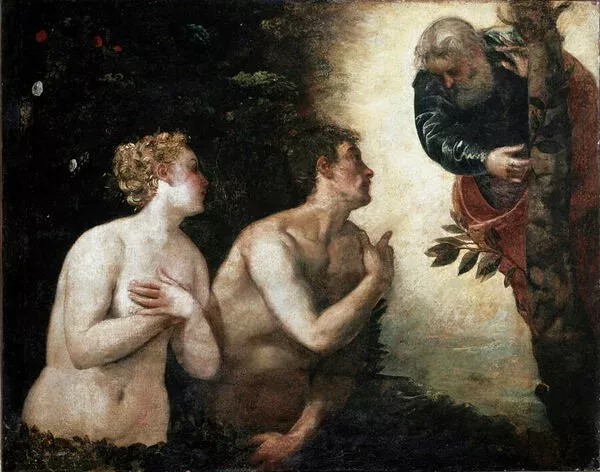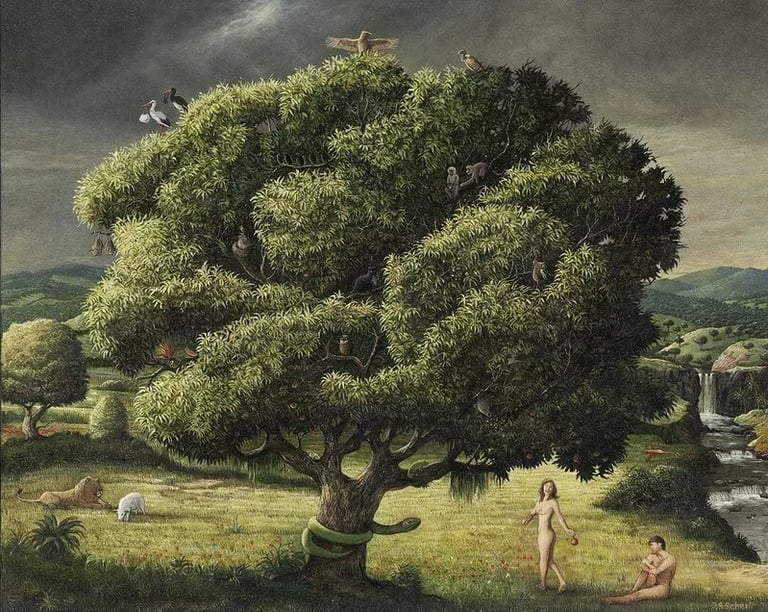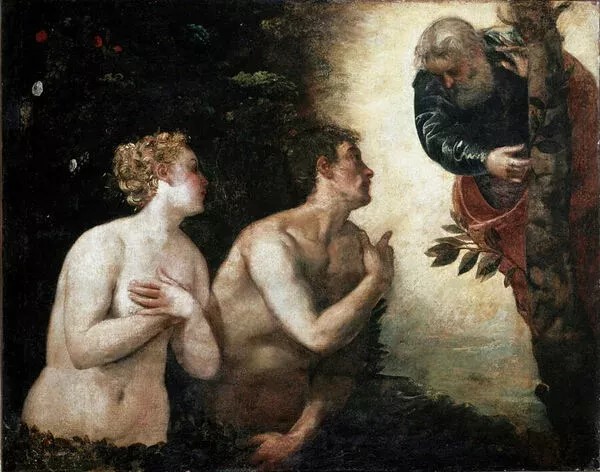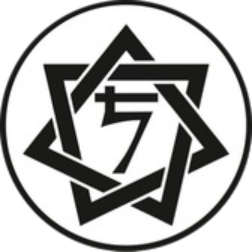CELESTIAL TREE
On what Tradition is and its manifestation over time.


Celestial Tree
If we imagine the Tradition as a tree that grows in its branches, becoming stronger and more tangible, from age to age, then the roots of this tree will not be in the earth, but in the heavens, while the branches will embrace the earthly world, penetrating it, giving its fruits, greenery and coolness. This is an image known to any student of the innermost knowledge. It reflects not only the universe itself, but is also a symbol of the spirit. It is the image of Man.
However, from the position of knowledge, in its essential meaning, it is also a symbol of Tradition. The eternal, original Tradition. There is no other, unless we are talking about dead knowledge that has faded away in the centuries, customs and some peculiarities in the religious perception of the world, which change from century to century, while retaining their essential nature, regardless of the form in which they clothe themselves. Genuine Tradition is the essence of knowledge. In a sense, we might call it transcendent in relation to the world in which we see it manifesting itself, in this or that religion and philosophy, theology, cosmogony and theogony. In the sense that it's not of this world. But this world is its reflection.
When the Austrian composer Gustav Mahler speaks of tradition as the preservation of fire, not as the worship of ashes - he means, among other things, just that. Fire is a symbol of eternity that can be summoned to manifest itself anywhere, in any era, and will always remain the same fire it was for myriad years before the earth took its form and man took life. The only question is how to call it to life, to bestow it on others, to pass on this knowledge.
We cannot speak of Tradition as some closed system of knowledge within which we act. Tradition is, in fact, a reflection of the Life of our life. We only give this truth this or that limited form, which we clothe with explanations and give this or that name to. There is Love - let us call it ‘Christianity’. But love exists whether there is Christianity or not. It existed before Christ, and it will exist forever after. In its essential meaning, it is the foundation that gave birth to this world. It is the basis on which we can build a religion, philosophy or anything else, giving it this or that name, considering it the Alpha and Omega of our life, and all that is outside - temporary or false. This is the essence of all the dogmas of the external institutions of religions: we are true, but everything outside of us is false. We are the only way to the Truth, the rest is of the devil. This is the outer layer of religion, which relates to the truth just as the body relates to the soul. Not the body, but the soul is eternal. Not religion, with its rituals and dogmas, but what it expresses in its essence is truth.
The origin of Tradition does not lie in some historical perspective - a certain point of reference that gave it life - nor in some social or cultural reality through which it is usually only partially understood and realised. The origin of Tradition lies in eternity, because what we call ‘tradition’ is nothing more than a form of realisation of a part of the eternal Tradition.
What we call traditional values is no more than a partial manifestation of Tradition itself, not Tradition in its entirety. It is a part of the Tradition perceived by a people, alive at the beginning and dead at the end. Because the life force that once filled these traditional ideas is too often gone, some historical period later, leaving behind only an empty form - a ritual, an image or a dead symbol, which has little meaning for people, but nevertheless continues to be a part of social life, thanks to conservative patterns, established customs and traditions. Of course, not always and not everywhere, and not in the masses. There are always individuals who are able to see behind a dead symbol the living truth that once filled this form, and to perceive again, and sometimes to give new life to what seems to have become a part of history. We might take Christmas as an example, which many in the world associate with American turkey and family meals, shopping for gifts in shops, Christmas trees and garlands. Not with Christ, and his birth in the world. En masse. At least in the Catholic world. By comparison, in this sense, the Orthodox tradition has preserved more of the living truth of the holiday, among the adherents of this branch of Christianity. And this reflects this idea that truth lies not in the form, but in what lies beyond it.
Unfortunately, Western civilisation, once a stronghold of Tradition, has now completely lost this connection with truth, thanks to scientific atheism, or rather, materialism. And this is reflected in the complete degradation of both values and culture, and of Western civilisation itself, which has begun its downward cycle, which will eventually lead to decline and fall, unless this movement is given a push in the other direction, which is possible only through a return to the mainstream of Tradition - not of the past, but of the eternal present. Such are the consequences of the modern philosophy of positivism - scientific materialism, which denies both God and Man.
We too often understand by the word Tradition some cultural, national, social and historical peculiarities - their totality. While this is not Tradition in itself, but only its external expression, and not in its entirety, as it was said above, but only in one or another aspect. And it is not so important whether we speak of astrology or of Tradition in the essential sense - the meaning remains the same. When we see the semblance of dead traditionalism, in the adherents of the bookish astrological tradition of the Middle Ages, Renaissance, Arabic, Hellenistic or Egyptian astrology, we see the same adherents of Christianity, who, observing rituals and dogmas, closed their hearts to the inner truth of their own religion, preferring external forms. What is the difference between them? Few people live by the precepts of Christ's Sermon on the Mount, preferring communion and absolution from the priest, going to sermons on Sundays and candles at the altar to get what they want. We can say the same about astrologers, who find it much easier to follow the dogmas of ancient books without noticing not only contradictions but also outright distortions in them, than to follow the light of reason, applying what they have learned with intelligence, recognising the above and using elementary common sense. For this requires not merely passive intellectual work in accumulating knowledge from books, but an active mind that shines a living light on the astrologer's practice. Not by the dead letter of books. In other words, one must become an astrologer internally, not appear to be one, even if not for decades, externally. Not the number of books studied, not their translations, as well as not writing comparative dissertations on ‘Astrology of the Middle Ages and Hellenism’ will make an astrologer an astrologer. Perception of the essence of our predictive art - the essence of understanding - is what can make a true astrologer. Just as a true traditionalist is not one who will study the external form of this or that tradition, of this or that people, but one who will not so much try to live this external form as perceive what is behind it, get in touch with the truth that this or that external form of tradition is trying to express - a particle of the original Tradition.
Tradition is what all the external traditions created by human beings try to express. It is a kind of nucleus that brings all these disparate parts together, remaining the same throughout world history. Tradition is unchanging in its eternity, but for us it constantly reveals itself from a new side, and not so much because Tradition changes, but because we change, our consciousness changes and with it our perception of the world, man and God, and thus of Tradition itself. It is not the world that changes, but we. In fact, Tradition is nothing more than a generic name for those eternal truths that underlie our world. We grasp them with our minds, each time believing that we have discovered something new, although it is an eternal present that has always been with us, but which we could not yet see because of our own mental blindness. No one cancels the recompense for what we have done, but Christ comes and speaks of a higher law - Mercy. Does retribution disappear with that? Of course not. Moreover, some still regard it as their only consolation, as their final truth. And can we say that this alienates them from Truth and God? No. It only makes their perception of Truth narrower, if I may put it that way, but it is still a piece of truth - the Mosaic law, in this case, expressing the eternal law of cause and effect.
And it is the same with those who move with the times - not by cancelling the past, but by revealing in it the truth hidden behind the external form, they acquire an even fuller perception of it through contact with the essential, not only the external manifestation. Love is an essential quality, if we may say so, but the Religion of Love is the external form in which man puts Love, with his own defects and limitations. And so, when we touch upon Love in astrology, we do not give it entirely to Venus, but we see it in everything: in the receptions which reflect our sympathies and antipathies, in the events which show attraction or rejection, not to mention the unity which pervades the celestial and the terrestrial, which is the only reason why we are able to see the events of life in the external symbols of the planets and stars. All this leads us not only to an understanding of the essence of the planets, but also to an understanding of the essence of the astrological Tradition, which is one and inseparable from the eternal Tradition, for astrology is nothing more than a reflection of life.
Let's take another example - mathematics and the numbers of Pythagoras. For some it becomes an entirely external form - mathematics per se - created for its own sake, enabling us to look at the universe with the help of numbers, to add and subtract, to do calculations and experiments. This is the external form. It becomes a metaphysical form when in numbers we begin to discern the laws underlying the universe. Numbers become an essential Tradition only when we do not simply comprehend the universe through numbers with our minds, but when we perceive behind the numbers the truth they express. This is Tradition. It stands behind the particular teaching that tries to express it. We could equate Tradition with Truth, and we would lose nothing of importance or significance, except for some subtle meanings, primarily in the fact that Tradition is the direct expression of Truth, its subtle eternal form, which is distorted and reduced in the human mind to an external tradition, custom and cultural or national peculiarities.
It is for this reason that Astrology cannot be learnt without understanding and comprehending Tradition. What do we know otherwise? Only its external form, expressed by this or that astrologer in books, articles or something else.
Tradition is the truth hidden behind the form. Traditionalism, on the other hand, is the adherence to a closed form, developed in the course of this or that external tradition over the centuries. Of course, traditionalism is as necessary for us as Tradition. After all, we do not yet possess a direct unconditional ability to perceive the Truth without any, if we may say so, improvised means, in the form of books, for example. Therefore, it is important to study what has been written earlier by astrologers of the past centuries, but it is more important to develop one's intuition - a higher perception - in the direction of what is behind these or those words. Comparative analyses of various sources can in no way be a panacea here, because this is still, if I may say so, a horizontal comprehension, whereas it should become vertical, or upward-looking - towards the Source. This is why the critical mind alone will never suffice here. And that is why those who are most often traditionalists - adherents of ancient astrology, usually in a bookish vein - have a very strong and developed intellect, but... not a mind that can soar upwards. They study the elephant like blind men, touching different parts, using the oriental comparison, instead of opening their eyes and seeing the whole picture.
In a certain sense, we could compare book astrology and essence astrology, with centre and periphery. What is on the periphery is the interest of the traditionalists. What is in the centre is Tradition. Traditionalists sometimes forget that what is important is what gives life to the periphery, not the periphery itself. And it is the same in a world that gives preference to the external over the internal - to the periphery over the centre, to tradition over Tradition. Grandmother's dress may be fine, and even beautiful and elegant, but it is good in a museum, not in life. More importantly, the dress is an outer covering, a garment that serves not only to conceal a woman's nakedness, but also to express beauty. Every century, as well as every decade and year, has its own aspirations in fashion, which may be similar, may be different, may be completely opposite. But clothes remain clothes - the essence. Fashion is the outward tendency to express the essence. Attachment to any one style of the past is traditionalism. This is the essence and quality, the essence and purpose, traditionalism and Tradition, in a practical sense.
The centre of Tradition is above, not somewhere in the mundane world. And the transmission of Tradition is not so much from left to right, or right to left, in historical perspective, but from top to bottom. It is a contact with the Eternal Truth, which is timeless. This knowledge cannot be destroyed or forgotten - it is eternal and unchanging. It is open to all, because it is the basis on which Man and the World were created. These are the original Principles that underlie our world. Not so much physical, nor metaphysical, but spiritual, divine, eternal and unchanging. That is why all the efforts of positive science will always be in vain as long as there is even one living soul in the world. The like recognises the like, and reveals itself to the like. Soul - Nature - God. And Man. The centre where the Three are one and inseparable. Eternal.
The greatest difficulty for Western mentality is that we confuse the notion of religiosity and spirituality, traditionalism and Tradition. When we refer to this or that religion, we refer to the external form of this or that aspect of Tradition, usually distorted or diminished to the point of unrecognisability. But when we touch the spiritual component of man, we substitute this notion with something religious and moral, which are not at all evidence in favour of spirituality, nor are they expressions of it. They can be a step on the way to spirituality, but by no means its Alpha and Omega. And it is the same with Tradition - traditionalism is only a step, and often a limiting step, not an elevating one, on the path to Tradition. Tradition is directly related to what we might call the spiritual basis of our world. But traditionalism is only an outward form of expression, often limited, distorted and partial.
Every time we drift away from Tradition, we not only drift away from God, we drift away from ourselves. We fall downward in our own development. In many ways, this is why the West is in such a stage of degradation and decline, not only in terms of culture and values, but also in terms of religion. However, this is not so much a natural process of our days, as a conscious, to some extent even anti-divine manifestation and conscious opposition. Therefore, just going into traditionalism, both in astrology and in life, will not be enough to return to the roots. It is necessary to go beyond the limitations of traditionalism, to the essential nature of Tradition itself. Because it is then that we can discover the truth behind both the so-called traditional values and the tradition of certain peoples, religions, philosophies or whatever. We can easily distinguish man from animal - although in behaviour and attitude towards each other, the latter are often superior to the former - because we are human beings ourselves. We recognise the like of ourselves. And it is the same with Tradition - as soon as we come into contact with Truth, we are able to recognise and discern it even in what seems distorted or decayed. Whether the question concerns the truth of astrology, or the Truth of life, is not so important. The point is the same.
Yes, the roots of the Tree of Tradition lie in the heavens - above. But the sky is not the firmament with stars and planets above our heads, but that which is beyond the visible world, and the reflection of which we see in these marvellous celestial bodies reflecting the greatness of the Cosmos. The greatness of Tradition.




Subscribe to our blog



